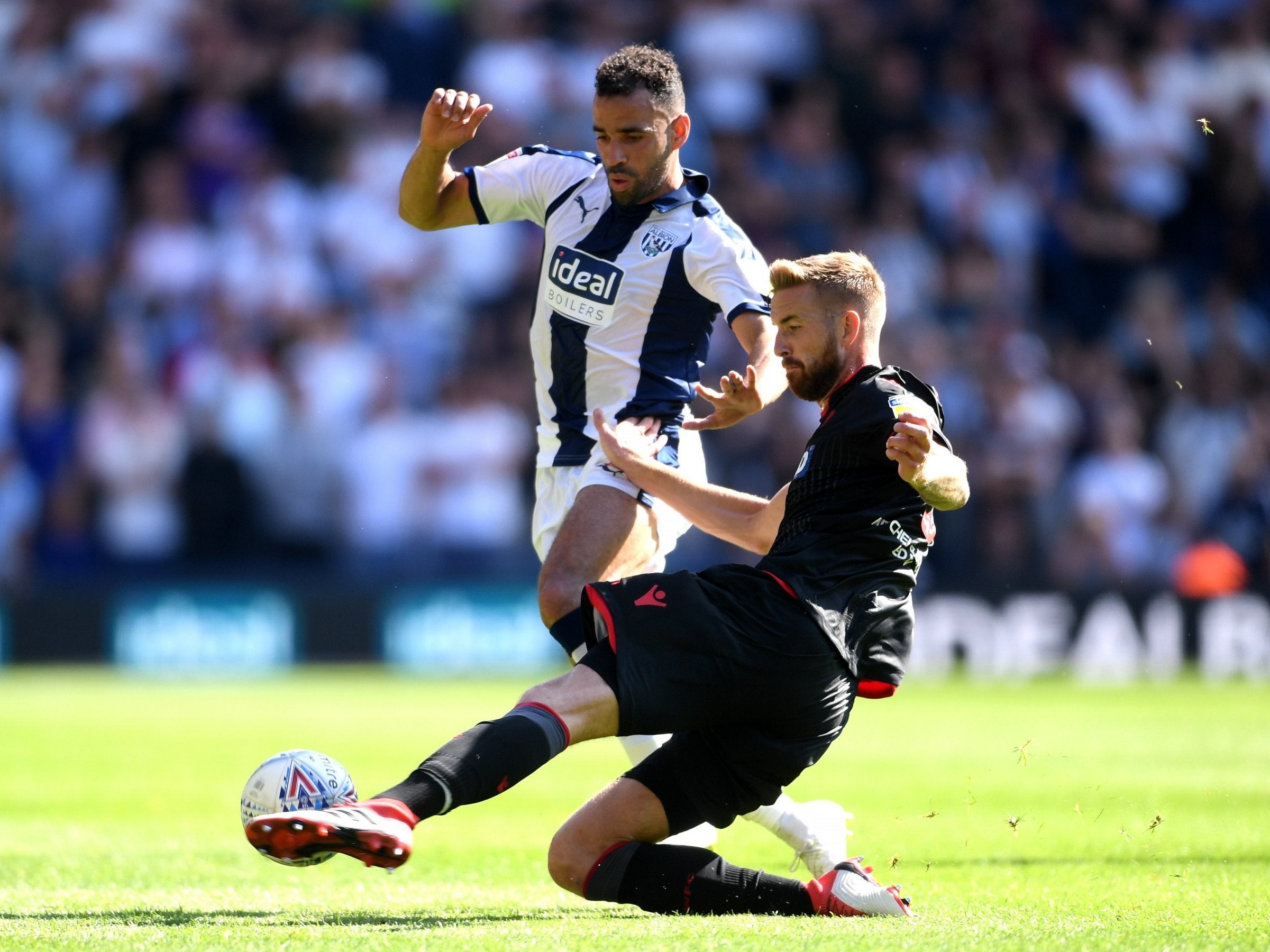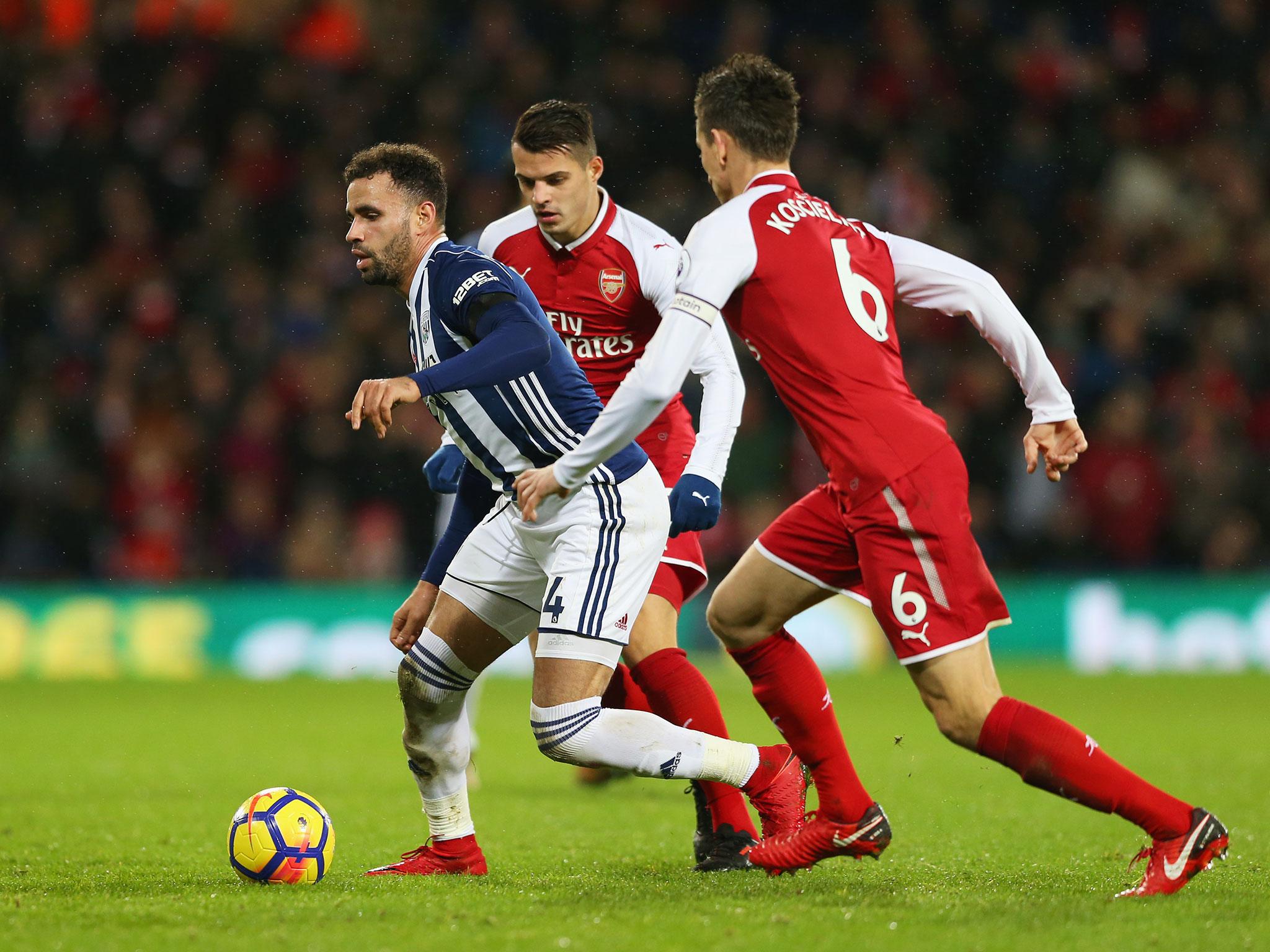Hal Robson-Kanu interview: West Brom striker by day, blockchain entrepreneur by night
The Wales and West Brom striker is an expert in blockchain technology and crypto-currencies, and intends to use his knowledge on a new application out next year

Your support helps us to tell the story
From reproductive rights to climate change to Big Tech, The Independent is on the ground when the story is developing. Whether it's investigating the financials of Elon Musk's pro-Trump PAC or producing our latest documentary, 'The A Word', which shines a light on the American women fighting for reproductive rights, we know how important it is to parse out the facts from the messaging.
At such a critical moment in US history, we need reporters on the ground. Your donation allows us to keep sending journalists to speak to both sides of the story.
The Independent is trusted by Americans across the entire political spectrum. And unlike many other quality news outlets, we choose not to lock Americans out of our reporting and analysis with paywalls. We believe quality journalism should be available to everyone, paid for by those who can afford it.
Your support makes all the difference.Thomas Robson-Kanu, known to the football world as ‘Hal’, is explaining exactly what ‘blockchain’ is. With patience and precision, he moves through the basic definitions towards more advanced concepts. What is crypto-currency? What is a smart contract? What is network effect? What distinguishes BitCoin from LiteCoin, or DigiByte from Ethereum?
If Robson-Kanu were not such a good footballer then he might have missed his calling as a computing lecturer. He certainly has the enthusiasm for his topic and the ability to explain it to those – like this interviewer – who know less about it than he does. Most footballers have their own private enthusiasms but not many can talk about them like this.
As we all know, by day Robson-Kanu is a canny, athletic centre-forward. He is an immortal in Welsh football history for those goals against Slovakia and Belgium at Euro 2016 two years ago. He plays for West Bromwich Albion, and his season began on Saturday when West Brom fell to Bolton Wanderers, their first game back in the Championship. Robson-Kanu is fit and looking forward to the campaign.

But by night, or rather in the afternoons, Robson-Kanu is a blockchain entrepreneur. When West Brom training finishes at lunch-time he drives down to London, sees his family and then goes to his office in Chiswick. Where he works until 9pm on ‘Sports Ledger’, the blockchain-based sport data-sharing platform his team have been developing for the last two years. "Lots of athletes have other interests. Some of my team-mates finish playing FIFA at 12.30 at night."
That is why Robson-Kanu is here, having coffee in Mayfair this week, talking about his “private passion” for blockchain technology and why he is so enthused to bring it to as many people as possible. So what exactly is it?
“Blockchain is basically a distributive ledger, where there is no need for any trusted intermediary,” Robson-Kanu explains. “So imagine it as an internet, but an internet where you can exchange value peer-to-peer. We have the internet now, but I couldn’t send someone £10 without requiring an intermediary, [like PayPal]. But with blockchain, it allows you to communicate, to transact, with one another, in a digital world peer-to-peer. That’s as simplistic as I can give it. That’s what blockchain is.”

It is not an easy topic to get your head around, especially given how many of us prefer to use technology rather than to learn how it works. “Not many people understand blockchain technology,” Robson-Kanu says. “It’s like trying to explain fundamentally how the internet works. But no-one cares how the internet works, and no-one understands how the internet works. They just know that they use it. That is what is going to happen with blockchain technology.”
But how did Robson-Kanu get so far ahead of the rest of the population, while working his way into Premier League football with the rest of his time? Always a bright student at school, Robson-Kanu left Twyford Church of England High School with a string of A*s at GCSE. “I just had an active mind,” he says. “Once I picked up something it was easy for me to run with it.”
Robson-Kanu grew up with friends who were fascinated by technology, apps and programming, and that meant he was too. At the start of this decade they started to talk to him about bitcoin. And, at first, he was sceptical. “Back in 2011, 2012, I didn’t really entertain it,” Robson-Kanu looks back. “Because I looked at the mainstream narrative on it. it was ‘illicit dealings, drugs, unsafe’. So I bypassed it for a good two years. After which point I came back to it, because of the [Bitcoin] price increase, from $10 to $15 up to towards $40. I was intrigued as to how this technology, or its digital asset, could have had such a significant growth. So I looked into it further, I read the Bitcoin White Paper, began interacting with the blockchain community. And I very quickly realised that this is the future. The ability to de-centralise and dis-intermediate every form of communication around the world…in a peer-to-peer manner, with no central authority, it’s groundbreaking.”
An avid reader, Robson-Kanu started to learn about blockchain and Bitcoin. He read ‘Digital Money’ by Andreas Antonopoulous, the great blockchain expert and advocate, and went to see him speak at the ‘Wired Money: Beyond Bitcoin’ conference. “He makes you understand it, which is a difficult thing to do because it can be quite complex,” he says of Antonopoulous. Robson-Kanu read up on the great innovators of the blockchain space, like Vitalik Buterin, founder of Ethereum, or Charlie Lee, founder of LiteCoin.
Robson-Kanu was impressed with these crypto-currencies and how they made it easier for large settlements between two parties because they did not require transaction fees. “The reason Bitcoin was created, it was meant for large settlements,” he says. “That’s peer to peer. That’s so significant in terms of the economic model our society is built upon now. Because we rely on central authority and intermediaries.”
But learning and understanding was never enough. Robson-Kanu decided that he wanted to get involved himself. He wanted to build something using blockchain technology that would encourage further use. “Our biggest thing is about adoption,” Robson-Kanu says. “How can we contribute to the adoption of blockchain technology? As I explained before, it’s about use-case. How can we deliver a service which instantaneously delivers use-case within the blockchain space? We would only be a small few who would deliver that.”

Robson-Kanu compares the current blockchain market to the state of the internet in 1993. When there were still opportunities for the “early adopters” who moved into the space before their rivals did. “We are going from innovators into early adopters now, and they will be use-case applications, the simplified versions. Then the early majority, the late majority, then the laggards. And the laggards are like our grandparents who are buying iPhones now. It shows how early we still are in the space, and we are talking about less than 1% of the global population. Imagine what it’s going to be when it’s 20, 30, 40% of the global population.”
So two years ago, Robson-Kanu, his brother David, childhood friend and developer Bozidar Ijacic and German blockchain expert Fabian Kippenberg decided to launch a blockchain-based sports application. Early last year they came up with the name ‘Sports Ledger’, and the application will be gradually rolled out from the second quarter of 2019 onwards.
The idea is for an ambitious data-sharing and interaction platform. It will aggregate sporting data from across the world, allow users to make comparisons, and help to make predictions. It will have a social sharing content platform too, in which user’s own preferences will create for them an “enriched digital identity”, which advertisers would want to access. So far, so Facebook.
But Robson-Kanu hopes that Sports Ledger will be different. Because blockchain’s peer-to-peer nature means that users will retain ownership of their own data, rather than giving it all up to someone else.

“If you look at traditional social sharing content platforms – Facebook, Instagram – the reality is that they completely own your data,” Robson-Kanu explains. “When we tick that box, when we sign up – most people never read it – you give complete ownership, and you also give complete rights to be communicated to, over to Facebook and Instagram. Their whole business model is built on the use of their users’ data, to sell it to advertisers, and to allow advertisers to communicate with them.”
This problem was clearly shown up by the Cambridge Analytica scandal, where the political consulting firm got access to the data of 87million Facebook users. For Robson-Kanu, that is proof of why blockchain platforms are so important. Because they allow users to keep control of their own data, rather than submitting it to anyone else.
“The fact that happened, that shows that there is an issue with data ownership,” he says. “If you are not in control of your own data, it can always be manipulated. You should own your complete data rights, I should own my complete data rights. That is the way it should be. But because of our current structures, there is no platform or foundations to allow for that. But now we are getting the opportunity to do so.”
With Sports Ledger, then, external companies would have to communicate with users to request access, “Because the application is decentralised, each user has complete ownership of their data,” he explains. “If you want to view a user’s data profile, you have to request access. It’s completely GDPR compliant.”
Eventually Robson-Kanu wants Sports Ledger to improve connections between clubs and fans and to even hold biometric data from athletes’ training sessions from all over the world, information that has never been public before. “Most blockchain enthusiasts have a bias for transparency,” he explains. “They feel that everything should be open and available for access.”
It all feels quite far away now but with the growth of blockchain and crypto-currency, these technologies will only become more present in our lives. “We are on the verge of mass adoption,” Robson-Kanu says. “We are moving, we have passed the network effect with blockchain technology. Once you get beyond a certain point of users, and awareness, it will continue to grow until it becomes mainstream. So there’s no way it can be reversed”.
Join our commenting forum
Join thought-provoking conversations, follow other Independent readers and see their replies
Comments